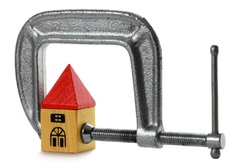Q: I have lived in my home for more than 15 years. In Spring, 2000, I received my 1999 property tax bill for $5,410.82. I just received the 2008 for $9,263.20, which is a 72 percent increase in just 9 years. I am 68 years old and retired. I want to stay in my house, but at the current rate of increase each year in my property tax bill that will not be possible. Since the real estate values dropped 2008, why did my tax bill still rise over $700 from the previous year?
What can be done? And how do we do it?
A: Your property has likely gone up in value dramatically since you’ve been living in your home. Is the property worth 72 percent more than 15 years ago? Maybe. But like so many areas of the country, it’s also likely that your property value has fallen dramatically. It’s just that the information your taxing agency is using to value your home may be lagging current information.
But there are some things you can do. First, if your taxing authority gives tax breaks to homeowners that live in the home as their primary residence, make sure that you take advantage of that tax benefit and file the required paperwork. As a senior citizen, some municipalities give you a tax break. If they do, make sure you take advantage of it.
Also, if you feel the valuation of your property by your local taxing authority is in error, you should contest your property taxes.
Please contact your local tax assessor’s office or local real estate taxing authority and ask for information on when you can contest your tax assessment and bill and how the office recommends you file your appeal.
Typically, a tax assessment board determine the value of a property on the basis of a recent purchase price, what other properties that can be similarly classified are valued, the amenities of the home, its construction properties, location in a neighborhood and various other qualities.
If you decide to contest the valuation of your property and your real estate taxes, you will want to see how your property compares to other homes in its same tax classification, along with a comparison of the type of home, its size, amenities, and condition. Some of these characteristics and the valuations are available online, but in other cases, your research will lead you to the office where those records are kept.
Once you have researched your home along with other similar homes, you’ll have a better idea whether your home’s real estate taxes are too high. If they are, you will have to present a case before the taxing authority to convince them to reduce your taxes.
That appeal may be as simple as correcting errors that the tax assessor has for your home. For example, the assessor believes your home is a two story, 3,800 square foot home when it’s really a one story 1,800 square foot home, you may receive a tax reduction once that error is corrected.
A more involved appeal would involve proving that the taxing board has made a mistake in valuing your home when compared to other similarly situated homes. Appeals of this type can take many shapes and forms.
There are local tax appeal attorneys and other experts who can help you through the appeal process. In some localities, you might end up paying about 25 percent to 50 percent of the first year’s savings, but won’t have to pay anything if the appeal isn’t successful. You’ll need to learn a bit more about how your taxes are computed and how people charge for their services. In some places around the country, the tax assessor will work directly with you to determine if there is a problem with your valuation. Keep that in mind before hiring someone to help you out. It really depends on the system that your local taxing authority uses and the size of the community.
Read more: Property Taxes May Be Deducted From Federal Income Tax Bill and Property Tax Missed Payments Causes Late Payment Fees to Rise.
Buy Ilyce’s ebooks: How to Understand and Shop for Health Insurance and Divorce and Your Finances. See all of Ilyce Glink’s ebooks.
June 4, 2009







Leave A Comment